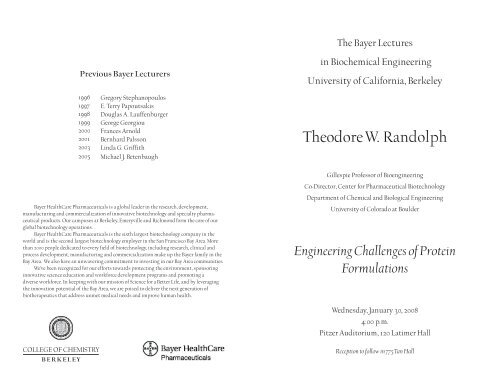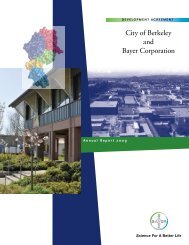Theodore W. Randolph - Bayer HealthCare Pharmaceuticals
Theodore W. Randolph - Bayer HealthCare Pharmaceuticals
Theodore W. Randolph - Bayer HealthCare Pharmaceuticals
Create successful ePaper yourself
Turn your PDF publications into a flip-book with our unique Google optimized e-Paper software.
Previous <strong>Bayer</strong> Lecturers<br />
1996<br />
1997<br />
1998<br />
1999<br />
2000<br />
2001<br />
2003<br />
2005<br />
<strong>Bayer</strong> <strong>HealthCare</strong> <strong>Pharmaceuticals</strong> is a global leader in the research, development,<br />
manufacturing and commercialization of innovative biotechnology and specialty pharmaceutical<br />
products. Our campuses at Berkeley, Emeryville and Richmond form the core of our<br />
global biotechnology operations.<br />
<strong>Bayer</strong> <strong>HealthCare</strong> <strong>Pharmaceuticals</strong> is the sixth largest biotechnology company in the<br />
world and is the second largest biotechnology employer in the San Francisco Bay Area. More<br />
than 2000 people dedicated to every field of biotechnology, including research, clinical and<br />
process development, manufacturing and commercialization make up the <strong>Bayer</strong> family in the<br />
Bay Area. We also have an unwavering commitment to investing in our Bay Area communities.<br />
We’ve been recognized for our efforts towards protecting the environment, sponsoring<br />
innovative science education and workforce development programs and promoting a<br />
diverse workforce. In keeping with our mission of Science for a Better Life, and by leveraging<br />
the innovation potential of the Bay Area, we are poised to deliver the next generation of<br />
biotherapeutics that address unmet medical needs and improve human health.<br />
COLLEGE OF CHEMISTRY<br />
B E R K E L E Y<br />
Gregory Stephanopoulos<br />
E. Terry Papoutsakis<br />
Douglas A. Lauffenburger<br />
George Georgiou<br />
Frances Arnold<br />
Bernhard Palsson<br />
Linda G. Griffith<br />
Michael J. Betenbaugh<br />
The <strong>Bayer</strong> Lectures<br />
in Biochemical Engineering<br />
University of California, Berkeley<br />
<strong>Theodore</strong> W. <strong>Randolph</strong><br />
Gillespie Professor of Bioengineering<br />
Co-Director, Center for Pharmaceutical Biotechnology<br />
Department of Chemical and Biological Engineering<br />
University of Colorado at Boulder<br />
Engineering Challenges of Protein<br />
Formulations<br />
Wednesday, January 30, 2008<br />
4:00 p.m.<br />
Pitzer Auditorium, 120 Latimer Hall<br />
Reception to follow in 775 Tan Hall
Engineering Challenges of Protein<br />
Formulations<br />
Protein therapeutics offer remarkable potential benefits to human health.<br />
Indeed, they form the fastest-growing new class of drugs. But because the<br />
mechanism of their action depends on their three-dimensional molecular<br />
conformation, this proper conformation must be preserved not only through<br />
production, but also through the drug’s shelf life and eventual delivery to<br />
patients. Thus, the engineer must deliver a purification process that yields a<br />
chemically and conformationally pure product, and also a set of conditions<br />
(temperature, pH, solution additives, container materials, etc., collectively<br />
called the formulation) that maintains these purities.<br />
In this talk, two examples of formulation engineering will be discussed.<br />
The first will explore the thermodynamic effects of formulation solutes on<br />
the kinetics of protein aggregation. Protein aggregation kinetics typically are<br />
modeled using the modified Lumry-Eyring framework, which assumes that<br />
the compact native protein exists in an equilibrium with reactive partially<br />
unfolded species that form the transition state for aggregation. These<br />
partially unfolded intermediates react through collisions with themselves<br />
(or existing aggregates) to form aggregates (or larger aggregates). Under<br />
favorable solution conditions described by the Wyman linkage relationship the<br />
equilibrium between the native state and the transition state intermediates<br />
can be shifted to favor the native state, reducing the concentration of reactive<br />
intermediates and, consequently, the rate of aggregation.<br />
The second example explores kinetic control of protein degradation<br />
reactions. Lyophilization can be used to create formulations of proteins<br />
contained in glassy matrices. Within these glassy matrices, some (but not<br />
all) undesirable degradation may be significantly inhibited. Rational design<br />
of lyophilization processes and the resulting glassy state formulations offer<br />
promise of ultra-stable protein therapeutics and vaccines; the particular<br />
example of development of a botulism vaccine will be discussed.<br />
<strong>Theodore</strong> W. <strong>Randolph</strong><br />
<strong>Theodore</strong> W. “Ted” <strong>Randolph</strong> received<br />
his Ph.D. in chemical engineering<br />
at the University of California, Berkeley,<br />
in 1987. He worked as a post-doctoral fellow<br />
at the École Polytechnique Fédérale de<br />
Lausanne and then joined the Department<br />
of Chemical Engineering at Yale University<br />
as an assistant professor. After promotion<br />
to associate professor, he was named to<br />
Yale’s first John J. Lee Junior Professorship<br />
in Chemical Engineering.<br />
In 1993, Dr. <strong>Randolph</strong> accepted the<br />
Patton Associate Professorship in the<br />
Department of Chemical Engineering<br />
at the University of Colorado at Boulder. He currently serves as the Gillespie<br />
Professor of Bioengineering, co-director of the University of Colorado’s Center for<br />
Pharmaceutical Biotechnology, and Director of the NIH Leadership Training in<br />
Pharmaceutical Biotechnology Program.<br />
Dr. <strong>Randolph</strong> is a National Science Foundation Presidential Young<br />
Investigator, and he has received the AIChE Professional Progress Award<br />
and the American Pharmacist’s Ebert Prize. His research interests include<br />
biopharmaceutical formulation, lyophilization of proteins, protein-solvent<br />
interactions in non-aqueous environments, and protein refolding.<br />
Dr. <strong>Randolph</strong> is an inventor on numerous patents, some of which form the<br />
basis for two companies that he has founded: RxKinetix (now owned by Endo<br />
<strong>Pharmaceuticals</strong>), a company formed to commercialize new extended-release<br />
drug delivery technologies; and BaroFold, a company that uses high-pressure<br />
protein refolding technology to develop and produce new protein therapeutics.



